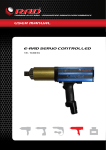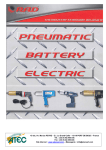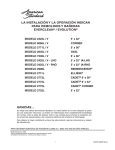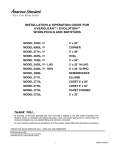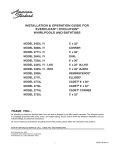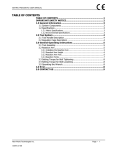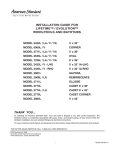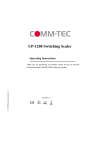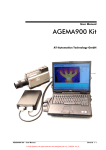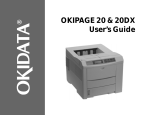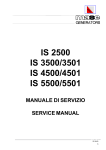Download USER MANUAL PNEUMATIC SERIES
Transcript
User manual RAD pneumatic torque wrenches - INNOVATION DRIVEN PERFORMANCE USER MANUAL PNEUMATIC SERIES 35 - 11.500 Nm Version 2.0 - march 2015 1 User manual RAD pneumatic torque wrenches Table Of Contents 1. General instructions 2.Assembly 3. Air pressure regulator 3 4. Setting torque 5. Movement of the reaction arm 5 6.Safety 7. ATEX certification 8.Warranty 6 9.Contact 8 Version 2.0 - march 2015 2 3.1 ½” NPT inlet 3.2 ½” NPT outlet 3.3 Automatic oiler 5.1 Installing the reaction arm 5.2 Reactie arm height 5.3 Reaction arm foot 5.4 Reaction point 8.1 New tool warranty 8.2 Repaired tool warranty 3 4 4 4 4 5 5 6 6 6 7 8 8 8 User manual RAD pneumatic torque wrenches 1. General instructions NOTE: Do not operate the tool before reading these instructions. If breakdown, malfunction or damage occurs, do not attempt to repair, please contact RAD Torque Systems B.V. immediately. When working in an explosive environment; Always make sure you use an ATEX certified torque wrench. This is indicated by the Ex marks on the torque wrench and FRL unit and the green earth cable with clamp on the FRL unit. RAD pneumatic torque wrenches are reversible, non-impacting, torque controlled tightening tools and must always be operated with the following: • Clean dry air supply (air consumption can be found on page 4) • Cage assembly with lubricator and regulator • Impact sockets with locking pin and o-ring • Proper reaction arm with retaining ring These torque wrenches contain metal components which can be dangerous if the torque wrench and FRL unit are not ATEX proof. 2. Assembly 1. Blow out hoses before connecting 1a. When ATEX certified; make sure that the original RAD hose is used between the torque wrench and the FRL unit 1b. When ATEX certified; first connect the clamp of the earth cable (green color mounted to the FRL unit) to the workpiece 1c. When used in areas with dust explosion risks, install the silencer to the air outlet of the torque wrench to limit dust whirling. Preferably, clear the environment of dust within a radius of 1 meter around the workplace before operating 2. Connect the wrench air inlet to the outlet side of the Cage Assembly, observing airflow direction 3. Connect air supply to inlet side of the Cage Assembly using a minimum hose size of 1/2” (1.27cm) 4. Check oil level in lubricator and fill to correct level 5. Fasten and secure the reaction arm on the jagged side of the gearbox with the retaining ring 6. When ATEX certified; after placing the socket, secure the socket with a pin and o-ring lock to prevent loosening of the socket. Regulator cage setup Air pressure regulator To increase air pressure (and torque), turn the “T” handle clockwise. Note: the tool must always be running when setting air pressure. RAD tool storage ½″ NPT outlet Install the supplied airline to the 1/2” NPT outlet port on the automatic oiler. The quick connect fitting at the opposite end of the hose will be attached to the RAD® tool. ½″ NPT inlet Install your air supply to the 1/2” NPT female port in the regulator. A minimum 1/2” airline must be used capable of 100psi at 30 cfm. Liquid filled pressure gauge Torque chart Always set air pressure with tool running Earth cable and clamp Only with ATEX certified version Air filter Version 2.0 - march 2015 Automatic oiler Fill the automatic oiler with air tool oil only. Fill from the top, or by removing and filling the bowl, then reinstalling from the bottom. 3 User manual RAD pneumatic torque wrenches WARNING! Always check all air hose connections before the air supply is activated. When the tool is in operation the reaction arm rotates in the opposite direction to the output square drive and must be allowed to rest squarely against a solid object or surface adjacent to the bolt to be tightened. WARNING! Always keep hands clear of the reaction arm when the tool is in use or serious injury could result. 3. Air pressure regulator Rotate clockwise to increase the air supply, and counter-clockwise to decrease the air supply. Note: the torque wrench should run freely while setting the torque. The direction is not important. 3.1½” NPT inlet Connect your air supply to the ½“ NPT inlet. The diameter of the hose should be at least ½ “. 3.2½” NPT outlet Connect the supplied air hose to the ½“ NPT outlet automatic oiler. The outlet on the other end of the hose is attached to the torque wrench. NOTE: The water tank from the filter outlet should be emptied periodically. The drain filter is accessible from the bottom of the FRL unit. 3.3Automatic oiler Fill the oiler with oil only for air tools. NOTE: Ensure a sufficient compressor capacity in terms of volume and pressure. Air motor Torque wrench NPW 120 100SL Air consumption 275SL 275SL (-2) 750SL (-2) 792 Liter at 6,7 bar per minute 10GX (-R) 14GX (-2)/(NX) 20DX (-2) NPW 180 1100NG (-2) (-XR) 1900NG (-2) (-XR) 1130 Liter at 6,7 bar per minute 34GX NWP 200 4000 (-2) 46GX 1727 Liter at 6,7 bar per minute 6800 UXR Version 2.0 - march 2015 80DX, 115GX, 110DX 900 Liter at 6,7 bar per minute 4 User manual RAD pneumatic torque wrenches 4. Setting torque Every RAD torque wrench is supplied with a torque chart which relates torque output to air pressure. Set the torque as follows: 1. Ensure the Forward/Reverse is set to “Forward” 2. Establish the air pressure required using the torque chart provided with the tool 3. Adjust the regulator until the correct pressure is shown on the gauge 4. The wrench must be free running while adjusting the air pressure to give the correct setting. WARNING: Exceeding the maximum air pressure will overload the wrench and may cause serious damage. When removing a bolt from the the connecting, the direction switch must be set on “reverse”. Then, the maximum torque need to be chosen. Operating the torque wrench: 1. Fit the wrench with the correct size impact socket to suit the bolt to be tightened. 2. Check that the Forward/Reverse switch is set correctly. 3. Rotate the handle to a convenient position relative to the reaction arm. 4. Fit the tool onto the bolt to be tightened with the reaction arm adjacent to the reaction point. 5. Squeeze the trigger partially to bring the reaction arm into contact with the reaction point. 6. Fully depress Trigger and keep fully depressed until wrench stalls. If the Trigger is released before the wrench stalls, full torque will not be applied to the bolt. 7. Release Trigger and remove the tool from bolt. 5. Movement of the reaction arm 5.1Installing the reaction arm Ensure the reaction arm and retaining ring are installed securely to hold the reaction arm in place. Make sure the reaction arm is in contact with a solid reaction point before you operate the tool. When the tool is in operation the reaction arm rotates in the opposite direction to the output square drive and must be allowed to rest squarely against a solid object or surface adjacent to the bolt to be tightened (Figure 1). Reaction point Clockwise operation Counter clockwise operation Figure 1 WARNING: In use, this tool must be supported at all times in order to prevent unexpected release in the event of a fastener or component failure! Version 2.0 - march 2015 5 User manual RAD pneumatic torque wrenches 5.2Reactie arm height Ensure the height of the socket is even with the height of the reaction arm as seen below in Figure 2A. The height of the socket cannot be shorter or higher than the height of the reaction arm as seen below in Figure 2B and 2C. ✔ Figure 2A ✘ Figure 2B ✘ Figure 2C NOTE: Improper reaction will void warranty and can cause premature tool failure. 5.3Reaction arm foot Ensure the foot of the reaction arm aligns with the length of the nut as seen in Figure 3A. The length of the foot cannot be shorter or longer than the nut as seen in Figure 3B and 3C. Figure 3A ✔ Figure 3B ✘ Figure 3C ✘ 5.4Reaction point Ensure the reaction arm reacts off the middle of the foot as seen in Figure 4A. Do not react off the heel of the reaction foot as seen in Figure 4B. Please contact RAD Torque Systems B.V. or your local RAD authorized distributor for custom reaction arms. WARNING: Always keep your hand and body parts clear of the reaction arm and barrel when the tool is in operation (Figure 4C). Figure 4A ✔ Figure 4B ✘ Figure 4C ✘ 6. Safety RAD tools use pressurized air to develop very large forces to tighten and loosen threaded fasteners. For your safety and that of others, warning labels and attention labels are prominently attached to the carrying cages, reaction accessories, and tools. NOTE: Make sure you observe the directions on the warning labels at all times. Version 2.0 - march 2015 6 User manual RAD pneumatic torque wrenches RAD tools have been designed with safety in mind however, as with all tools you must observe all general workshop safety practices, and specifically the following: • Before using your new tool, get familiar with all its accessories and how they work • Always wear safety goggles when the tool is in operation • When working in an explosive environment, always be sure you use an ATEX certified torque wrench • Make sure the reaction arm is in contact with a solid contact point before you operate the tool • Keep your body parts clear of the reaction arm and the contact point • Set your air pressure while the tool is running • Refer to the enclosed torque chart to set the correct air pressure regulator setting for a required torque • Never exceed the maximum air pressure shown on the torque chart • Always use the regulator and oiler that is supplied. Failure to do this voids the warranty and can place you in danger • Be sure to use a minimum 1/2” airline to the cage assembly as this will allow for adequate air flow • Make sure the reaction arm snap ring is securely in place to hold the reaction arm or blank in place. RAD tools are safe and reliable. Not following precautions and instructions outlined here can result in injury to you and your fellow workers. New world technologies incorporated is not responsible for any such injury. 7. ATEX certification As option, RAD torque wrenches are available with ATEX certification. The applied RAD ATEX certification is explained below. See our website for more information: www.radtorque.nl/atex. The RAD torque wrenches are marked according to ATEX 95 and suiteable for use in zone 1, 2, 21 and 22 with explosion group IIA and IIB or dust group IIIA and IIIB. II = Suitable for explosive environment above ground Ex = certified by an approved CENELEC test center 2G/D = Protection class 2 for gas and dust, therefore suitable for zones 1, 2, 21 and 22 CE = Complies relevant EC directives T6 = Maximum surface temperature <85°C, therefore suitable for zones with temperature classes T1 till T6 CE II 2G/D Ex c IIB/IIIB T6 Ex c = meets the constructional safety according to EN 13463-5 IIB = Explosion group, therefore suitable for gas zones with explosion group IIA and IIB IIIB = dust group, therefore suitable for dust zones with dust group IIIA and IIIB Registration number: LCIE 8663323.01.15 If you have an ATEX certified torque wrench please note the following: • Socket must at all times be secured using the locking pin and o-ring • The reaction arm must be at all times be secured using the retaining ring • There should be at all times a earth connection with the work piece. Version 2.0 - march 2015 7 User manual RAD pneumatic torque wrenches 8. Warranty 8.1New tool warranty Any new tool branded with the RAD name and purchased from RAD Torque Systems B.V., or through one of its authorized distributors or agents, is warranted to the original purchaser against defects in materials and workmanship for a period of twelve (12) month from the date of delivery to the end user. This guarantee is valid until fifteen (15) months after the original calibration date. Furthermore, the warranty conditions determine that no warranty applies if: 1. The defect, wholly or partly, is due to unusual, inappropriate, improper or careless use of the product; 2. The defect, wholly or partly, is due to unusual, is due to normal wear and tear or lack of proper maintenance; 3. The defect, wholly or partly, is due to unusual, is due to installation, assembly, modification and / or repair by the customer or by third parties; 4. The product altered, modified, used or processed is; 5. The product is transferred to a third party; 6. RAD Torque Systems B.V. has abtained the product, wholly or partly, from a third party, and RAD Torque Systems B.V. can not claim compensation under warranty; 7. RAD Torque Systems B.V. in manufacturing of the product raw materials, and suchlike has used on the instructions of the customer; 8. The product has a small deviation in it’s quality, finishing, size, composition and suchlike, which is not unusual in the industry or if the defect was technically unavoidable; 9. The customer has not fulfilled all obligations under the agreement promptly and correctly towards RAD Torque Systems B.V.. 8.2Repaired tool warranty After the warranty has expired a three (3) month warranty applies to the original purchaser against defective in material or workmanship or both from the date of repair. To qualify for the above mentioned warranties, written notice to RAD Torque Systems B.V. must be given immediately upon discovery of such defect, at which time RAD Torque Systems. will issue an authorization to return the tool. Freight costs must be paid in advance. When returning a tool, the reaction arm/s being used with the tool must also be returned. For the latest warranty terms, please see our sales conditions on our website www.radtorque.nl 9. Contact RAD Torque Systems B.V. Zuidergracht 19 3763 LS Soest Telephone: 035-5882450 E-mail: [email protected] Website: www.radtorque.nl Version 2.0 - march 2015 8 User manual RAD pneumatic torque wrenches MINING OIL & GAS WINDPOWER AEROSPACE PETROCHEMICAL MANUFACTURING COMMERCIAL VEHICLE INDUSTRY MASTER DISTRIBUTOR FOR EUROPE, MIDDLE EAST AND NORTH AFRICA: RAD TORQUE SYSTEMS B.V. ZUIDERGRACHT 19 3763 LS SOEST THE NETHERLANDS PHONE.: +31 (0)35 - 5882450 E-MAIL:[email protected] [email protected] [email protected] WWW.RADTORQUE.NL Version 2.0 - march 2015 9









